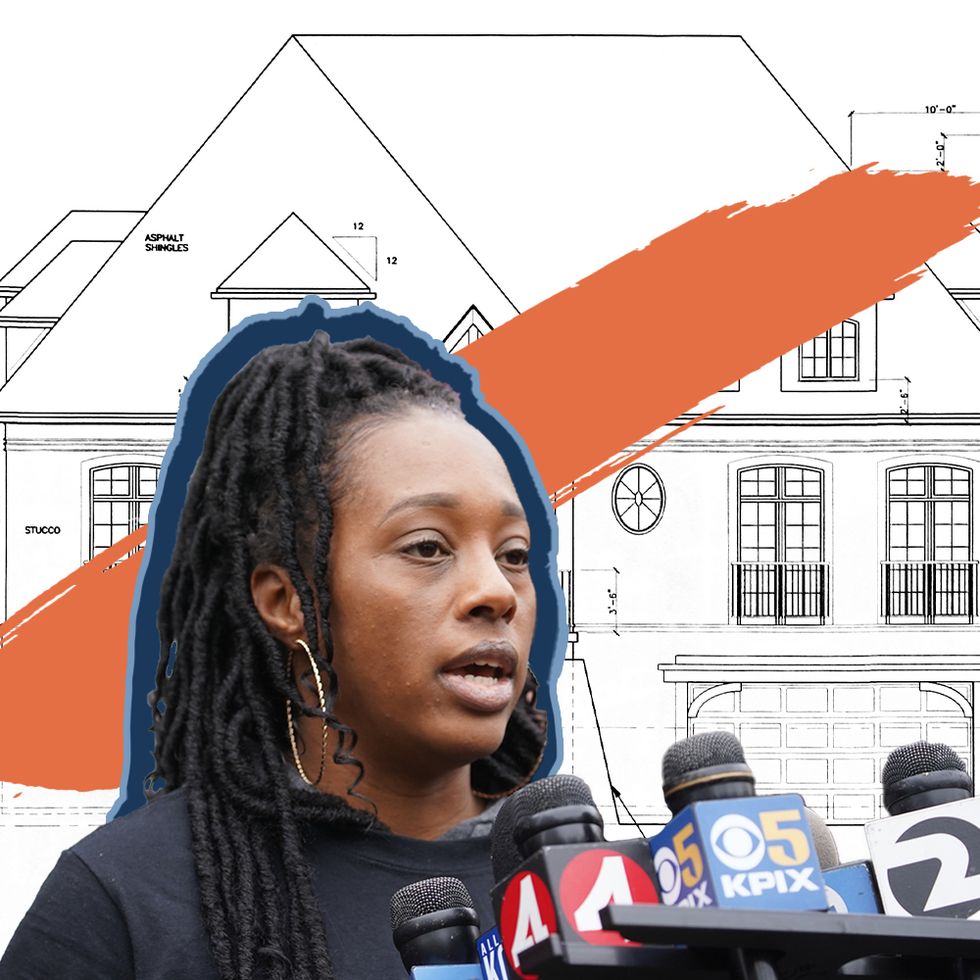About This Project
Last November, Dominique Walker had a radical plan: Occupy a vacant house in her hometown to protest the fact that there are far more empty houses in Oakland, California than those in need of a home. Though she had the support of the community, Wedgewood Inc., a house-flipping company that owned the home, sued to have them thrown out.
“I’ve never seen an eviction done in that manner. There were [Roomba-like] robots that came into the house, like we were terrorists. They sent the robot in first, and then they came in. They had AR-15s and military fatigues, and tanks for mothers and babies,” Walker says, recalling the Tuesday morning this past January when the incident happened.
The women of Moms 4 Housing — a collective of homeless and housing insecure mothers in Oakland who are working to reclaim vacant homes in their communities from speculators and profiteers — were evicted from 2928 Magnolia Street and arrested.
“It was terrible, but it just highlighted the conditions that we live under,” Walker continues. “When mothers are just trying to provide a basic need for their children, they’re treated this way.”
When Walker and Sameerah Karim decided to occupy the long-vacant three bedroom, one bathroom house in West Oakland, they sent a list of demands to Wedgewood Inc., who purchased the home at auction for about $500,000 in July 2019.
Aware of Mom 4 Housing’s mission to highlight the role of real estate speculators in driving up the cost of housing in the Bay Area, community members chipped in to make the Magnolia Street house livable for the women and their children. Then Walker, Karim and other members of their collective, including Misty Cross, took residence in the home for 58 days.
“Before we occupied the house on Magnolia Street, myself along with the other moms had tried going through the system that’s in place here, when you need assistance and things like that, and we weren’t helped,” says Walker.
By the time Moms 4 Housing formed in the fall of 2019, Walker had exhausted her options to find affordable housing.
Seven months earlier, she’d moved back to Oakland from Jackson, Mississippi, where she was working as a lactation consultant. With her six-month-old son and four-year-old daughter in tow, Walker came back to Oakland, which was marked by high rents, skyrocketing mortgages, and a proliferation of homeless encampments. It was very clear that Oakland was not the city she left many years ago to attend Tougaloo College in Mississippi. “It was an emergency situation. I didn’t have time to plan, to save. I was experiencing domestic violence from my partner,” Walker says of her hasty return to her hometown. “I left to come home, and home wasn’t the same. I couldn’t afford to live here. Even working two jobs, I could not afford a place to stay.”
As of January 2020, the minimum wage in Oakland is $14.14. But, the housing wage — defined as the hourly wage that a full-time worker would need to earn per hour to pay rent — is $40.33 for a two bedroom rental. According to Zillow, the median price for homes sold in the city is $756,800 and the median rent is $3,000 per month, far higher than what most longtime residents can afford. Additionally, a housing shortage, an influx of high-wage earners flocking to the Bay Area for jobs in the tech industry, private firms (that benefited significantly from 2008 recession and foreclosure crisis) buying properties, and city government’s failure to ensure affordable housing are a few of the things that have contributed to Oakland’s housing crisis.
Like many others in Oakland, Walker tried her best to find stable housing for her family. Between April and November of 2019, she had multiple living arrangements. First, she and her children lived with an aunt in Stockton. Her days started around 4:00 am when she’d get the children up, take them to daycare in Berkeley (a one hour and 30 minute drive without traffic), and then head to work in Oakland. When that situation didn’t work out, she tried living in short-term hotels, which proved to be too expensive and unsafe. Walker then moved in with family members in Antioch, 40 minutes outside of Oakland. Everyday, she made the commute to an organizing job where her role was helping the housing insecure and unhoused search for resources.
Frustrated, Walker turned to a trusted friend, activist and organizer Carroll Fife, for advice. In a time when Oakland’s homeless population had increased by 47 percent in just two years, Walker was not the only one turning to Fife for guidance.
“I knew that each one of the women who came to me for help, they needed something that didn’t exist. They needed access to affordable housing,” explains Fife, who was there with the women as they took over the Magnolia property. “They needed something that was affordable to people making $14 an hour.”
After talking to Fife, connecting with other mothers in a similar situation, and doing more research on the housing crisis, they knew what they needed to do. The idea to occupy one of the nearly 6,000 vacant properties in Oakland was risky. But the women were more focused on the morals of the situation rather than the legality. They decided on an act of civil disobedience, inspired by the fourth point of the Black Panther Party’s 10-point platform — “decent housing, fit for the shelter of human beings” — in the same city the revolutionary group was founded. Still, Walker says some still misunderstand what Moms 4 Housing is trying to accomplish.
“People call us squatters. A squatter comes in and they’re in hiding. This was to bring awareness to speculation in our community,” Walkers says, explaining she wasn’t worried about the repercussions of the takeover. “I was more scared of not having housing for my children than occupying a house.”
About three weeks after they initially moved into the home, the collective received an eviction notice from Wedgewood Inc.
The women fought against the order in court, but Alameda Superior Court ruled in favor of the property flippers. On Monday, January 13th, hundreds of community members and activists gathered outside of the home in support of the moms. When videos of the January 14th eviction and arrests surfaced, the national and local support for Moms 4 Housing grew, pushing the mayor to get involved.
Shortly after the eviction, Mayor Libby Schaff announced that Wedgewood Inc. agreed to sell the home to the Oakland Community Land Trust. This spring, they will close on the Magnolia property, purchasing the 1,400 sq foot home for the women to move into. However, there is still a lot of work to be done to make the house inhabitable.
“We have architects on board who are willing to donate their time, we need to raise money to renovate. Habitat for Humanity says the house is a teardown,” explains Fife, Regional Director of Alliance of Californians for Community Empowerment (ACCE). She says Moms 4 Housing’s fight serves as inspiration for what’s possible when people stand up. “The overall consensus is that this is a symbol of resistance. It’s not a 100 percent win, but I think it will stand as a pillar in Oakland. This is the house that moms built,” says Fife.
For these women, the movement doesn’t stop with the property on Magnolia. Over the last few months, they’ve received calls from the U.K., the Philippines, and across the U.S. for advice on occupying vacant homes, advocating for equitable housing, and fighting against gentrification. In April, Reclaiming Our Homes, a Los Angeles-based group, occupied vacant properties owned by the state. On May 1st, Reclaim SF took over an investor owned property in San Francisco. Both cite Moms 4 Housing as an inspiration. In recent weeks, the women of Moms 4 Housing have been actively working to help homeless mothers access hotels and get them off streets during the COVID-19 pandemic. While each of the group’s founders has secured housing as they wait for the property at Magnolia to be rehabilitated, the fight was never just about them.
“I saw the difference that just moving into that house had on my children. My one-year old took his first steps in that he said his first words in that home,” says Walker. “If you’re living in a tent and you’re housing insecure, you’re confined to one particular space with your children, they don’t even have that space to develop. I saw that it is so important and every child deserves that.”
Next up is amending the California constitution to make housing a human right for all people.
As of 2019, the homeless population in California was 151,000 people. Governor Gavin Newsom requested $1.4 billion for resources, but the money would not secure housing for all homeless people. Moms 4 Housing and ACCE are working on legislation that they hope to get on the ballot.
“Everyone in California should have access to housing. You can’t build anything else without it. You can’t thrive without safe and secure housing. So it’s a human right and our government needs to make it so,” says Fife. “If they can’t find the political will to do that, then the work will be to continue to reclaim vacant properties.”
VISIT SHONDALAND.COM


